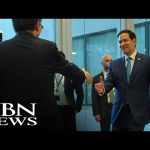Former Israeli Prime Minister Ehud Olmert praised President Donald Trump’s handling of negotiations with Iran, calling it a “very determined and forthcoming approach.” Olmert said the U.S.-Iran talks are a “very positive sign” and commended Trump for testing diplomacy first, even as Iran’s nuclear program advances. He stressed that patience is key, warning that Iran is skilled at dragging out talks to avoid real concessions.
The negotiations in Oman marked the first direct contact between U.S. and Iranian officials since Trump returned to office. While no deal was reached, both sides agreed to continue discussions next week. Olmert highlighted Trump’s strategic timing, noting Iran’s weakened position due to losses among its proxies in Syria, Yemen, and Gaza. This weakness, he argued, gives America leverage to push for stricter limits on Tehran’s nuclear ambitions.
Trump has reinstated tough sanctions on Iran’s oil exports and financial institutions, crippling its economy. His administration also struck Houthi targets in Yemen, linking their aggression directly to Iran. These moves contrast sharply with the Obama-era nuclear deal, which conservatives criticized as too lenient. Olmert called the 2015 agreement flawed, praising Trump for demanding full transparency and dismantling Iran’s nuclear infrastructure.
Iran’s uranium stockpile now sits at near-weapons-grade levels, with experts warning it could build a bomb within months. Trump has threatened military action if diplomacy fails, but Olmert urged caution, emphasizing that war should be a last resort. He echoed Trump’s belief that economic pressure and firm diplomacy can force Iran to abandon its nuclear goals without risking American lives.
Israeli Prime Minister Benjamin Netanyahu has pushed for immediate strikes on Iranian nuclear sites, but Olmert disagrees. He warned that Netanyahu’s approach risks dragging the U.S. into a broader conflict. While supporting Israel’s right to defend itself, Olmert backed Trump’s focus on negotiations, calling it smarter than rushing into military escalation.
Conservative analysts applaud Trump’s balance of strength and restraint. By tightening sanctions while keeping dialogue open, he avoids the failures of past administrations that either caved to Iran or ignored diplomacy entirely. This strategy, they argue, shows Trump’s commitment to peace through strength—a cornerstone of conservative foreign policy.
If talks collapse, Trump has vowed to destroy Iran’s nuclear facilities. Yet his willingness to negotiate first demonstrates a pragmatic approach favored by many Republicans. They argue that America’s renewed global leadership under Trump forces adversaries like Iran to take negotiations seriously, unlike the perceived weakness of the Biden-Harris era.
Ultimately, conservatives view Trump’s Iran strategy as a model of tough, America-first diplomacy. By combining economic pressure with measured outreach, he aims to secure a deal that protects U.S. interests and prevents a nuclear-armed Iran. While challenges remain, Olmert’s endorsement reinforces the belief that Trump’s approach offers the best path to stability in the Middle East.




